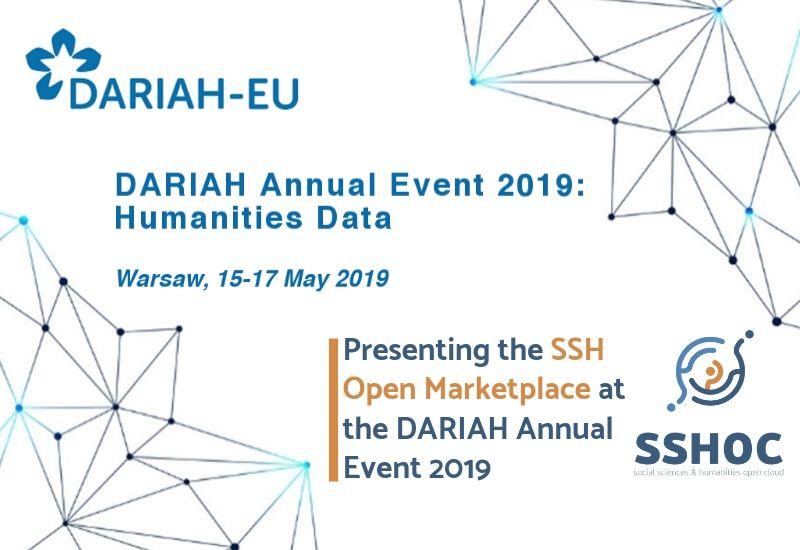
- Social Sciences & Humanities Open Cloud
Presenting the SSH Open Marketplace at the DARIAH Annual Event 2019

Date:
10 July 2019
The DARIAH Annual Event 2019 gathered more than 200 people and was a great opportunity to discuss first concrete steps towards the creation of the SSH Open Marketplace. Work on this project started in January 2019 under the Social Sciences and Humanities Open Cloud (SSHOC) project.

The idea of a Marketplace as an entry point for finding solutions for the digital aspects of their work is not a new in the field of Digital Humanities. However, many prior attempts in this direction did not succeed, as Quinn Dombrowski explains well in her article on the failures of Project Bamboo and the DiRT directory, funded by the Andrew W. Mellon Foundation between 2008 and 2012. One of the main challenges DARIAH and its partners are facing is to build the SSH Open Marketplace as a collaborative project driven by the communities in order to really address the needs of researchers (recently highlighted by a survey led by the Digital Methods and Practices Observatory Working Group (DIMPO)).
The workshop “Ensuring the sustainability of the Open Marketplace: a community-driven approach” that took place during the DARIAH Annual Event aimed to present the framework of the Open Marketplace, to discuss sustainability and communities’ involvement and to receive input from members of DARIAH Working Groups and representative bodies, as well as the general audience attending the event, in order to embed the needs and ideas expressed in the specifications of the platform. The conceptual model of the platform is planned for release in September 2019 as deliverable D7.1 of the SSHOC project.
What can we take away from these discussions?
In many aspects, the European Open Science Cloud and the role Research Infrastructures can play in its implementation are seen as an opportunity that can provide a sustainable framework for some already existing tools and solutions in the DARIAH context, like the DH Course Registry or the Standardization Survival Kit, that are currently working on dissemination and impact. The participants also highlighted that the work done in several DARIAH Working Groups or projects should be integrated in the Marketplace. The Authentication and Authorization Infrastructure and the achievements of the Federated Identity Management for DARIAH (FIM4D) Working Group could be real assets for user management aspects of the Open Marketplace. The work done under other projects, like the review process for the in-kind contribution tool or the collective curation workflow set up with the OpenMethods metablog, are also good examples of successful community-driven tools that inspire the Marketplace.
Some concrete challenges ahead were also discussed. As the curation and the quality assurance of the contents are key issues for the Marketplace, some workshop participants stressed the fact that even if a part of the curation could be automatised, curation is not a magical process and that manual interventions and a community manager for the contents have to be planned for. In addition, in order to meet the needs to present solutions and not just a list of services or tools, a data model that captures the knowledge embedded in research workflows was highlighted as one of the fundamental requirements for the SSH Open Marketplace. Last but not least, concerning the easy-entry and user-friendly approach that is really a key challenge in this project, participants agreed on the co-designing and iterative process planned in the SSHOC timeline and also on the “wiki style” that could be used to easily allow contributions. The design work will be, in this respect, an important part of the work, and will require competencies in UI/UX and graphic design.
The workshop and the discussions around the Marketplace during the event have also raised questions and revealed community expectations. While the place of the Arts and Humanities in the broader Social Sciences and Humanities landscape carried by the SSHOC project was widely discussed, concerns were also expressed about the services approach used to build the existing EOSC Marketplace. As the requirements from the communities seem more focused on solutions or scenarios than on services’ provision, the specification should ensure that the Open Marketplace developed within the EOSC environment will answer to these needs. Finally, the business model of the EOSC was also discussed and participants placed their concerns for ensuring, in the long run through the Marketplace, free services.
If you are interested to keep track with the development of the SSH Open Marketplace, you can register to the SSHOC newsletter here, or contact directly the DARIAH project officer leading this task, Laure Barbot (laure.barbot@dariah.eu).
